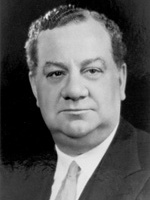William Warren Barbour
| William Warren Barbour | |
|---|---|
 |
|
|
United States Senator from New Jersey |
|
|
In office December 1, 1931 – January 3, 1937 |
|
| Preceded by | Dwight Morrow |
| Succeeded by | William H. Smathers |
|
In office November 9, 1938 – November 22, 1943 |
|
| Preceded by | John G. Milton |
| Succeeded by | Arthur Walsh |
| Personal details | |
| Born |
July 31, 1888 Monmouth Beach, New Jersey |
| Died | November 22, 1943 (aged 55) Washington, D.C. |
| Political party | Republican |
William Warren Barbour (July 31, 1888 – November 22, 1943) was an American Republican Party politician who represented New Jersey in the United States Senate from 1931 to 1937 and again from 1938 until his death in office in 1943. He was also a business leader and amateur heavyweight boxing champion in both the United States (1910) and Canada (1911).
William Warren Barbour, the third of four brothers, was born in 1888 to Colonel William Barbour and his wife, Julia Adelaide Sprague, in Monmouth Beach, Monmouth County, New Jersey. His eldest brother, Thomas Barbour, a general naturalist and herpetologist, served as director of the Museum of Comparative Zoology at Harvard. His father, Colonel William Barbour, was founder and president of the Linen Thread Company, Inc., a thread manufacturing enterprise having much business on both sides of the Atlantic.
William Warren Barbour attended the public schools, but ultimately graduated from the Browning School, New York City in 1906. He also entered Princeton University but left after one semester to join The Linen Thread Company, of which his father was president. William Warren Barbour became president of the company in 1917 when his father, "The Colonel", died.
As a teenager, Barbour suffered from tuberculosis, which he overcame by intensive exercise and participation in sports. These athletic pursuits included boxing, which eventually led to his becoming amateur heavyweight boxing champion of the United States in 1910, when he defeated Joseph Burke, and Canada in 1911.
...
Wikipedia
